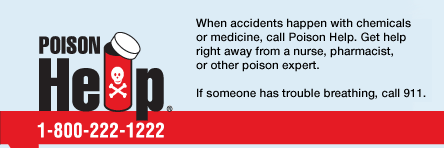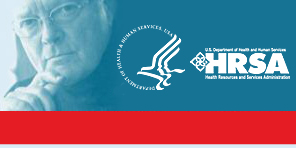

 |

|
Get the Facts About Poisonings and Poison Safety (PDF, 160 KB) Visit the Adobe Reader Web site and follow the instructions to download the appropriate version of Adobe Reader for your operating system. POISON HELP 1-800-222-1222 PoisonHelp.hrsa.gov When accidents happen with chemicals or medicine, call Poison Help (1-800-222-1222). Get help right away from a nurse, pharmacist, or other poison expert. THE FACTS ABOUT POISONINGS AND POISON SAFETY FICTION: Poisonings usually involve bleach and other household cleaners. FACT: Household cleaners are just one type of poison. These products do cause many poisonings. But be aware that other poisons can be just as dangerous. We keep many products around the home that we don't think of as poisons. • pest killers • hydrocarbons (such as lamp oil, kerosene, gasoline, lighter fluid) • plants Among adults, these things often cause poisonings: • pain medicines • alcohol • bites and stings • spoiled food • beauty products Carbon monoxide (CO) is a poison that can kill children and adults. CO is a gas that has no smell. You can't see it. You don't know when it's present. That makes it VERY DANGEROUS. So, when it comes to poison prevention, be aware of ALL poisons-those under your sink AND other places in your home. FACT: Poinsettias are not deadly. But the plant does cause minor discomfort in some people. Contact the poison center for more information. Many plants are poisonous. If a child eats any part of a non-food plant he's not supposed to eat, call Poison Help (1-800-222-1222). FICTION: Poisonings are not a great safety risk. People are hurt more often in cars, fires, and other accidents. FACT: Poisonings happen more often than car accidents or house fires. That's true especially among young children. Did you know that each year in the United States: • About one million possible poisonings are reported for children under 6. Also, many people don't know about the poison risks linked to many products. So people are less careful about poison safety than about car or fire safety. It is important to (1) be aware of the dangers of different poisons and (2) take the same amount of care with poison safety as with other dangers. FICTION: Regular operators answer the Poison Help line. FACT: Health care experts, including pharmacists, nurses, and doctors work at poison centers across the country. One of these experts will answer the phone when you call Poison Help (1-800-222-1222). All of these medical experts have passed special training to handle poison emergencies. Also, they are the EXPERTS IN YOUR COMMUNITY. They are trusted by local doctors, pharmacists, nurses, and emergency workers. And they offer the best information on poison-related questions and treatments. The Facts about Poison and Poison Safety FACT: There are 61 poison centers around the country. If you call poison Help (1-800-222-1222), you are connected to the poison center for your area. You will not talk to a national phone operator. YOU WILL TALK TO A LOCAL EXPERT. For any poison emergency or question, call 1-800-222-1222. You can talk to an expert any time of day or night, 7 days a week. Call this number from anywhere in the United States. FICTION: The Poison Help number is only for emergencies. You should use it only when someone shows signs of poisoning. FACT: If you think someone has been poisoned, call Poison Help (1-800-222-1222). DON'T WAIT for signs of poisoning. Many poisonings can be avoided with a call to the poison center. Your problem can most likely be solved on the phone. The medical experts will provide help with any possible poisoning, even if you are not sure a poisoning has occurred. Call Poison Help if you think your child may have swallowed poison. Call Poison Help if you have eaten food that was left out too long. Do not wait for signs of poisoning. Check with an expert at Poison Help (1-800-222-1222). Poison centers also provide teaching materials and services. FICTION: Most poisonings can be avoided with basic common sense. FICTION: Poison Help is important only for parents of young children. FACT: Poison Help is an important tool for adults and children. Did you know that: 50.7 percent of possible poisonings occur in children under age 6, BUT more than 70 percent of all poisoning deaths occur in adults ages 20 to 59. Many adults are unaware that alcohol, medicines, and others products can poison you. Also, many adults do not guard against carbon monoxide. Poison Help (1-800-222-1222) can provide help with ANY poisoning situation, no matter your age. You can talk to an expert 24 hours a day, 7 days a week. FICTION: If someone has been poisoned, call 911, not Poison Help. FACT: 911 is a very important number to call in emergencies. But for poisoning events, it is best to call Poison Help. Poison Help is best at handling poisonings and answering questions about them. Often an expert at Poison Help (1-800-222-1222) can help you over the phone. The expert can give first aid advice. He or she can tell you what to look for. In fact, more than 70 percent of poisonings are taken care of on the phone. A call to Poison Help (1-800222-1222) could save you money on a costly emergency room visit. If the poison expert thinks you have an emergency that requires hands-on care, the expert will tell you to call 911. It is important to keep 911 in mind for ALL other emergencies. In any situation-even poisonings-if someone is not breathing, you should call 911 fast!
|
|